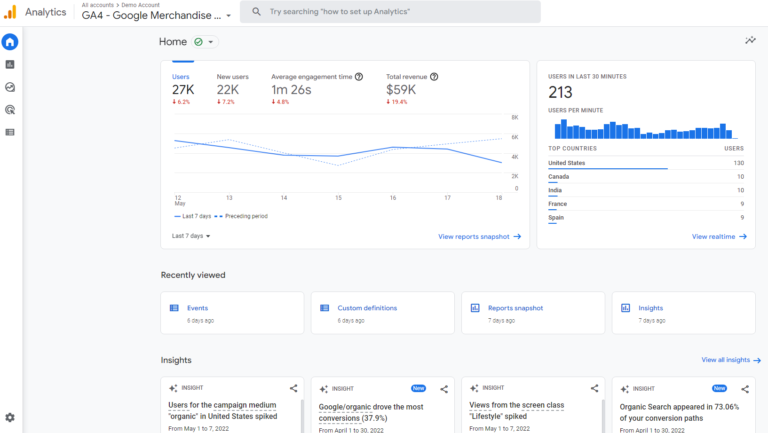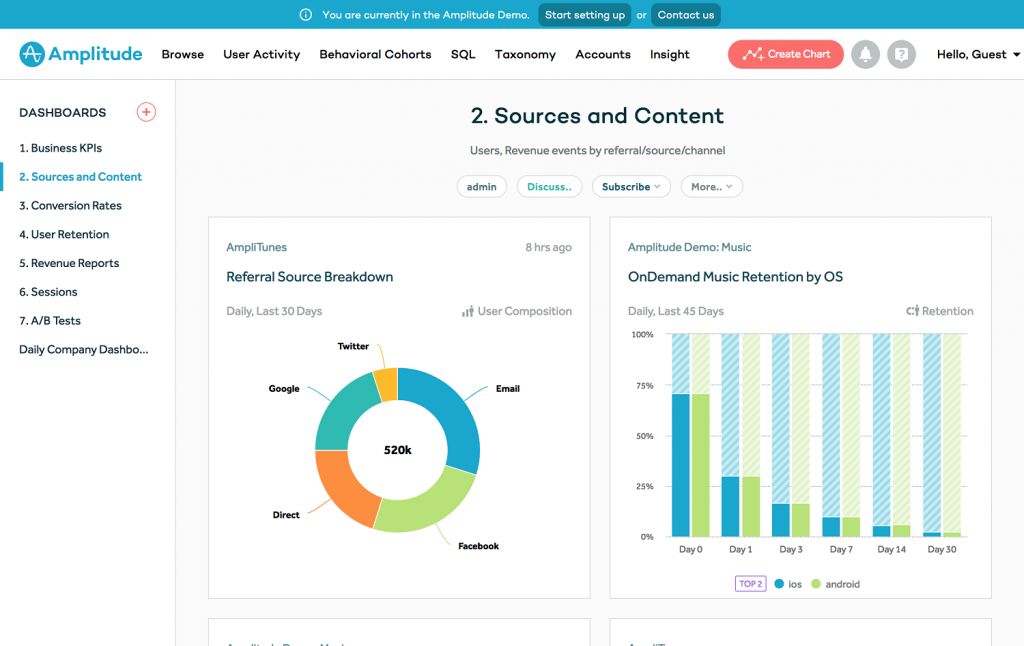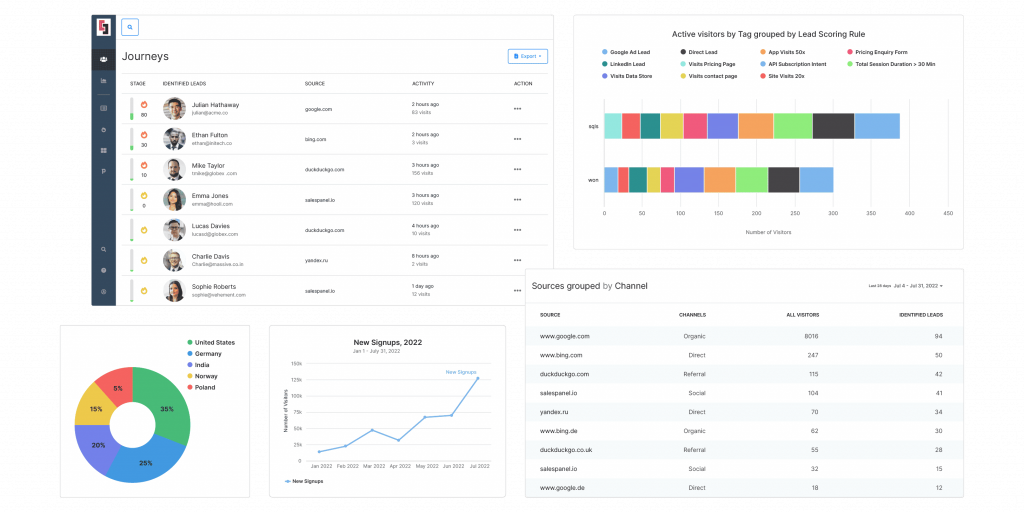Google Analytics 4 vs Amplitude: Understanding What Sets Them Apart
Understanding users and their behaviors is the key to making more strategically guided decisions. While some analytics tools are free, B2B customers often weigh their options as they are willing to invest in a product that suits their needs and provides quality support.
However, with dozens of analytics tools on the market, how do you choose one? Perhaps you’re considering Google Analytics 4 and Amplitude. What are the differences between them? Which one is the right choice for you?
Or, are there better options that might be more beneficial for your business?
Let’s compare Google Analytics 4 and Amplitude to determine which is the best fit for you. Additionally, we’ll discuss what you might need from a B2B analytics solution.
What is Google Analytics, and What Features Does its Current Version, Google Analytics 4, Offer?
Google Analytics is a free web analytics tool offered by Google that helps website owners and marketers to track and analyze website traffic and user behavior.
It provides valuable insights into how visitors interact with a website. The insights include information on the number of visitors, where they come from, what pages they visit, how long they stay on a page, and more.
The latest version of Google Analytics, known as Google Analytics 4 (GA4), is a significant upgrade from the previous version. It offers a new approach to tracking user behavior and measuring website performance.
GA4 uses machine learning and AI to provide deeper insights into user behavior (predictive analytics). The tracking approach used in GA4 is more cohort-centric. It focuses on user interactions with the website as a whole, rather than tracking individual visitors.
A key feature of GA4 is the ability to track users across multiple devices and platforms, including mobile apps and web browsers. This allows for a more holistic understanding of user behavior.
With GA4, businesses can understand how users interact with them across different channels. It also offers advanced event-tracking capabilities. Businesses can track specific actions that users take on their website or app. These actions include but are not limited to clicks on buttons, form submissions, or video views. This data can be used to optimize the user experience and drive conversions.
Another notable feature of GA4 is its integration with Google Ads. Google Analytics is the only tool that can read GCLID data from Google Ads. Every other tool needs to use UTM tracking to get data from the platform.
GA4 offers a more holistic approach to web analytics compared to everything else on the market and the data it tracks is unparalleled. While Google Analytics 4 remains a valuable tool, other notable tools can outperform it depending on your use case.

What is Amplitude?
Amplitude is a powerful product analytics tool that offers businesses a comprehensive view of user behavior across their digital products.
Equipped with robust user behavior tracking functionalities, Amplitude empowers businesses to compile data on a myriad of user actions such as clicks, swipes, and form submissions. The insights derived from this data illuminate the ways in which users interact with distinct product features.
Amplitude stands out with its ability to segment user data on diverse parameters like demographics, behaviors, and actions. Consequently, businesses can tailor experiences to resonate with specific user groups.
The platform also provides funnel analysis capabilities. Businesses are thus able to track user journeys and identify areas where users drop off or experience friction. With this data, businesses can optimize their products and improve conversion rates.
Additionally, A/B testing capabilities enable businesses to test different versions of their product and analyze the impact on user behavior. This data-driven approach allows businesses to make informed decisions about product changes and optimizations.
Amplitude also integrates with a wide range of tools and platforms. These include marketing automation tools, CRM systems, and data visualization tools.
With these integrations, businesses can bring together data from different sources and gain a complete view of the customer journey. With this holistic view of user behavior, businesses can optimize their products and create a seamless user experience.

Google Analytics 4 vs Amplitude
Now that we have discussed how both tools work, let’s do a head to head comparison in some key areas.
1. Data Modeling and User Identification
Google Analytics 4 provides a simplified approach to user identification and data modeling, utilizing predictive analytics to automatically categorize users into audiences based on shared behaviors and actions. This allows for a comprehensive and accurate insight into user behavior, eliminating the need for manual segmentation.
Amplitude, on the other hand, adopts a more detailed approach to user identification and data modeling, enabling the addition of custom user properties and event tracking for precise user targeting and segmentation. This can be particularly beneficial for companies needing to analyze more intricate user behavior and data.
Moreover, Amplitude boasts a feature known as Behavioral Cohorts, which automatically groups users based on common behavioral patterns. This feature proves invaluable for identifying and targeting specific user segments based on their unique behaviors.
2. Pricing
Google Analytics 4 is entirely free to use. However, as with any service that’s offered for free, there’s a trade-off involved. In this case, the product is the users and their data. This has raised some issues regarding Google Analytics’ compliance with GDPR, as Google uses this user data. You can find more information about this in our article on Google Analytics Alternatives
For enterprises seeking more advanced features and priority customer support, Google offers a version of the service called Google Analytics 360. However, this comes with a hefty price tag of $12,500 per month.
Amplitude offers a free plan for up to 10 million events per month. The free plan tracks about 100,000 unique users. Their paid plans start at $995 per month and offer additional features and better customer support.
3. Data Ownership
Google’s entire business model revolves around using data as a commodity and selling ads and while you still own your data, the lines are not as clear and things are complex (discussed on the GA alternatives article linked earlier).
Amplitude is more like any SaaS freemium business out there that are not going to use your data for nefarious reasons. They allow businesses to maintain ownership of their data and provide options for hosting data on their own servers.
4. Features
Google Analytics 4 offers features such as cross-device tracking, predictive analytics, and machine learning. It also offers integration with Google’s advertising tools. With it, users can create remarketing lists and measure ad campaigns easily.
Amplitude offers features such as user behavior tracking, funnel analysis, and cohort analysis. It also offers advanced data visualization and reporting features. It also offers integrations with other popular tools such as Slack and Salesforce.
5. Implementation and Ease of Use
Google Analytics 4 is relatively easy to implement. Users who have used its previous version, Universal Analytics, will almost feel at home with it.
It provides a wide range of resources and documentation to help users set up and customize their tracking. The platform also offers a user-friendly interface that is easy to navigate and understand.
Amplitude is also easy to set up and use. It has an intuitive and user-friendly interface. It, however, has a steeper learning curve for a few important features. Its advanced data visualization and reporting features need some learning to implement.
Amplitude does provide a rich library of resources and documentation to ease you into making the most out of its capabilities.
6. Customer Support
Google offers documentation and community support for Google Analytics 4. To expect anything more from such a capable tool provided for free would be a futile.
If you really want experts at Google to help you, you will have to cough up $150,000 annually and upgrade to Google Analytics 360.
Amplitude offers customer support through email, chat, and phone, with additional resources available for paid customers.
That brings us to the end of this comparison. Still wondering if there is a better alternative to both Google Analytics 4 and Amplitude? You just may be in luck!
Salespanel as an Alternative to Google Analytics 4 and Amplitude
Salespanel is a B2B customer journey tracking and analytics tool. It’s a better alternative to both Google Analytics 4 and Amplitude when it comes to analyzing customer journeys and behavior for B2B sales and marketing. If your end goal is statistical analysis, Amplitude and GA4 might be better picks for you. However, if you are focused on tracking first-party data of every high ACV B2B prospect.
One of the key features of Salespanel.io is its ability to track behavior of every individual visitor on your website and qualify them in real-time.
B2B businesses can see which companies are visiting their website, what pages they are looking at, and how they are interacting with their content. Thus, they can prioritize their sales efforts, identify high-quality leads, and deliver a personalized customer experience for top prospects.
Salespanel scores leads for you automatically using AI and machine learning but you can also. You can direct your resources toward high-quality leads that will convert
When it comes to integrations, Salespanel enjoys native integrations with CRM platforms such as Salesforce, HubSpot, Pipedrive, and more. There are many other tools you can use Salespanel with using native integrations or with Zapier.
All in all, Salespanel can serve as a good alternative to Google Analytics 4 and Amplitude. Might be a good pick if you are focused on B2B analytics and customer journey tracking.

Sell more, understand your customers’ journey for free!
Sales and Marketing teams spend millions of dollars to bring visitors to your website. But do you track your customer’s journey? Do you know who buys and why?
Around 8% of your website traffic will sign up on your lead forms. What happens to the other 92% of your traffic? Can you identify your visiting accounts? Can you engage and retarget your qualified visitors even if they are not identified?


